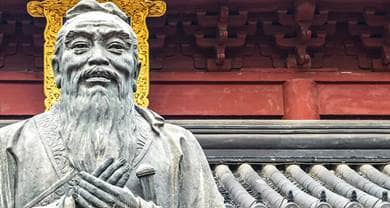- Trending:
- Forgiveness
- |
- Resurrection
- |
- Joy
- |
- Afterlife

RELIGION LIBRARY
Confucianism
Founders
Confucius is believed to have been born around 551 B.C.E. and to have died in 479 B.C.E. He traveled from state to state teaching the sons of the nobility about leadership and morality. He was not famous during his lifetime, and never achieved the high position he aspired to as an advisor to a great ruler. In this respect, later depictions of Kongzi as a powerful player in the events of his time and a well-known figure in early Chinese history are not faithful to the historical record.
Kongzi was born in the small feudal state of Lu in what now is Shandong province in northeast China. He lived between the social instability of the "Spring and Autumn Period" (770-481 B.C.E.) and the descent into violence and chaos known as the "Warring States Period" (403-221 B.C.E.). Like nearly every thinker of his time, Kongzi interpreted social disorder as evidence that human beings had lost a once-harmonious relationship with Tian and its Tao (Way), the source of all life and order in the universe. In framing his vision of the Way, Kongzi relied on a number of Western Zhou sources, including historical documents, governmental decrees, poetry, and ritual texts that were later given the title "classics" or "scriptures" (jing). Kongzi used Western Zhou culture to formulate a challenge to his own times.
Kongzi's disciples came from the social class known as shi ("retainers" or "knights"), who traditionally served the Western Zhou kings. With the collapse of the Western Zhou order, shi became lordless anachronisms and fell into genteel poverty and itinerancy. Their knowledge of ancient aristocratic traditions, however, helped them reinvent themselves as antiquarian advisers to the competing rulers of the "Warring States." Kongzi himself is said to have held such a position, albeit only for a short time before withdrawing into retirement as a Ru ("scholar," the root term in the Chinese equivalent of the word "Confucian"), a ritual master and teacher of future court advisers. His students and their followers later shaped Kongzi's teachings and view of the Chinese past into what became Confucianism.
 One of the most influential early Confucian thinkers after Kongzi's time was Mengzi. Like Kongzi, Mengzi was born into the shi class. According to later Chinese historians, Mengzi was a native of Zou, a small state near Kongzi's home state of Lu in the Shandong peninsula of northeastern China. He is said to have studied with Kongzi's grandson, Zisi, although most modern scholars doubt this. While Mengzi apparently held office in the state of Qi, his title may have been no more than an honorary one. His service in Qi did place him in close proximity to the Jixia Academy, a kind of early Chinese "think tank" sponsored by the ruler of Qi that produced, among other thinkers, Mengzi's later critic Xunzi.
One of the most influential early Confucian thinkers after Kongzi's time was Mengzi. Like Kongzi, Mengzi was born into the shi class. According to later Chinese historians, Mengzi was a native of Zou, a small state near Kongzi's home state of Lu in the Shandong peninsula of northeastern China. He is said to have studied with Kongzi's grandson, Zisi, although most modern scholars doubt this. While Mengzi apparently held office in the state of Qi, his title may have been no more than an honorary one. His service in Qi did place him in close proximity to the Jixia Academy, a kind of early Chinese "think tank" sponsored by the ruler of Qi that produced, among other thinkers, Mengzi's later critic Xunzi.
Mengzi developed a theory of human nature (renxing) that eventually was accepted by most Confucians, even though, according to the Lunyu, Kongzi had very little to say about the subject. Mengzi taught that "by fully developing one's mind, one knows one's nature, and by knowing one's nature, one knows Tian" (Mengzi 7A1). For Mengzi, the journey toward morality begins with birth as a being that naturally is oriented toward goodness (ren). One then proceeds toward maturity, guided by the examples of ancient sages and the ritual forms and texts they have left behind. Habitually doing what is right, one eventually uplifts oneself from the merely human to that which Tian intends for one, which is to become a sage. Nature is crucial to moral development, but so is nurture. Mengzi's model of moral psychology involves both discovery (human nature is good) and development (human nature can be made even better).
 Although Mengzi's theory of human nature became the basis for most Confucian moral psychology, prior to the Han dynasty, it was the theory advocated by his opponent Xunzi that found most favor among Confucians. Xunzi was born in the state of Zhao during the late 4th century B.C.E., which means that he is unlikely to have met Mengzi. Like Mengzi, Xunzi apparently was employed by the state of Qi and also held office in the state of Chu. While Xunzi undoubtedly attracted many faithful Confucian disciples, it also seems that he taught Li Si (c. 280-208 B.C.E.), Han Fei (c. 280-233 B.C.E.), and other thinkers later associated with the anti-Confucian Qin dynasty, and he may even have lived to see the unification of China under the Qin regime. Other students of Xunzi's evidently supervised the preservation of the Western Zhou text known as the Shijing (Classic of Poetry), which helped transmit Xunzi's influence into the Han dynasty.
Although Mengzi's theory of human nature became the basis for most Confucian moral psychology, prior to the Han dynasty, it was the theory advocated by his opponent Xunzi that found most favor among Confucians. Xunzi was born in the state of Zhao during the late 4th century B.C.E., which means that he is unlikely to have met Mengzi. Like Mengzi, Xunzi apparently was employed by the state of Qi and also held office in the state of Chu. While Xunzi undoubtedly attracted many faithful Confucian disciples, it also seems that he taught Li Si (c. 280-208 B.C.E.), Han Fei (c. 280-233 B.C.E.), and other thinkers later associated with the anti-Confucian Qin dynasty, and he may even have lived to see the unification of China under the Qin regime. Other students of Xunzi's evidently supervised the preservation of the Western Zhou text known as the Shijing (Classic of Poetry), which helped transmit Xunzi's influence into the Han dynasty.










